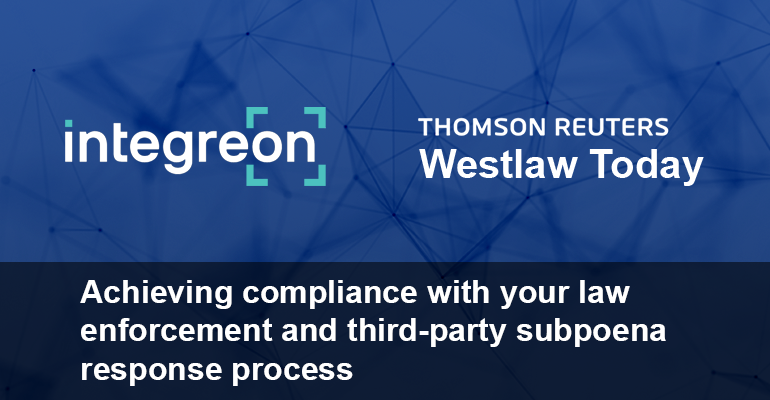This article originally appeared on Thomson Reuters Westlaw Today on February 12, 2024. View the original article here.
Robert Daniel and Mark Grant of Integreon, Inc. explore areas legal operations professionals should consider in responding to law enforcement and third-party subpoena requests while ensuring legal compliance and protecting user privacy.
Legal operations serve as a center of strategic planning, vendor management, knowledge management and legal practice outsourcing for corporate legal departments. As such, the legal operations team becomes a catch-all for any task possessing a legal component that does not involve active litigation. Third-party subpoena response and law enforcement response are two examples.
Data is being created at an alarming rate and is playing an increasingly significant role in the resolution of lawsuits and law enforcement investigations. Organizations must navigate the complex landscape of responding to law enforcement and third-party subpoena requests while managing the unpredictability of request volumes, ensuring legal compliance, and protecting user privacy under deadline pressure.
This article explores areas legal operations professionals should consider when striking a balance between meeting their legal obligations to their customers while ensuring transparency and accountability at each stage of the response process.
Understand legal obligations
The legal operations function commonly sits within a corporation’s in-house legal department. The type of information request, jurisdictional requirements, request volumes and deadlines often can influence the experience level of the legal operations team members required to complete the response task as well as the size and physical location of the team.
Legal operations teams play a crucial role in interpreting and understanding the legal obligations placed upon organizations when it comes to responding to law enforcement and third-party subpoena requests. They must thoroughly analyze and apply relevant laws and regulations, as well as adhere to response deadlines to ensure compliance.
They also must consider the ways in which an information request may impact a company’s response or overall obligation to respond. For example, legal and jurisdictional nuances can alter what could be considered an otherwise standard response to a law enforcement request. A third-party subpoena requesting a substantial amount of data may be found to be unnecessarily burdensome and trigger an objection to the requestor or a request for reimbursement of expenses associated with the time and resources it takes to compile a large production response.
Establish clear response policies and procedures
To manage law enforcement requests and third-party subpoenas effectively, legal operations professionals should establish clear policies and procedures that detail the steps and criteria for responding to such requests. The use of standard operating procedures (SOPs) will ensure consistent and transparent handling of requests and help protect user privacy while meeting legal obligations.
Quality Assurance (QA) or Quality Control (QC) processes should be incorporated in the guidelines to assess the accuracy and consistency of data production as well as ensure compliance with company policies and procedures. Policies and procedures that do not facilitate speed and/or accuracy of review should be reassessed. A workflow assessment also can prove beneficial in identifying duplicative steps that reduce efficiency or add little to no value to the response process.
Protect user privacy
Legal operations professionals should prioritize protecting user privacy and work to minimize the disclosure of sensitive information. They should carefully consider the scope and necessity of the information requested by any requesting parties, ensuring that only the data most relevant to an information request is shared and only within the limits prescribed by the law.
Customer data found to be privileged or not relevant to the request must be redacted or removed from the production response. When the production response is shared with the requesting party, ensure that data is encrypted, and password protected regardless of how data is transmitted. Inadvertent production of personal information could cause a privacy event creating a need for disclosure and correction.
Collaborate with legal counsel
Collaborating closely with internal or external legal counsel to navigate the complexities of third-party subpoena responses and law enforcement requests provides valuable expertise, ensuring that the organization’s actions align with legal requirements and to mitigate risk associated with non-compliance or unauthorized disclosure.
If teams processing these requests are outside of Legal, close oversight and approval of processes and procedures is needed. Either internal or external counsel should review and provide guidance on response procedures to ensure adequate and legal production of client/customer data.
Request tracking and transparency
Maintaining transparency and accurate records throughout the process is essential. This is particularly true when responding to law enforcement requests, as the actions prompting the information request are criminal in nature.
It is recommended that legal operations document all law enforcement request types, response actions taken, and any disclosures made to ensure accountability and facilitate audits or investigations if necessary. Some companies collect these data points and make them available to the public in the form of transparency reports.
Such reports build trust with users and stakeholders and enhance the organization’s credibility in managing such requests. Counsel should review and ensure the response process and any associated reporting adhere to the responding company’s privacy policies.
Provide ongoing training
Regular training sessions should be conducted to ensure all employees understand their roles and responsibilities when dealing with third-party subpoenas and law enforcement requests. The laws governing the response process change frequently, and ongoing training will ensure any changes in obligations are met as well as facilitate consistency in productions across response teams.
Considering the use of an alternative legal service provider (ALSP)
Ensuring timely compliance can come with increasing costs, as scalable resources often are needed to address the unpredictability of request volumes and response deadlines. Collaborating with an ALSP can provide capacity to manage these ever-changing aspects of the process and can reduce strain on a legal department’s budget.
Legal departments should consider the following when deciding to engage an ALSP:
- Experience — How long has the ALSP provided relevant types of services? For how many industries have they provided them? Do they have legal and/or compliance experience?
- Scope of services — How many types of requests are being processed? What specific response tasks are being performed? Are they performing the response process end-to-end?
- Breadth of services performed — In how many regions or countries has the ALSP provided active support?
- Accuracy rates — What are the ALSP’s accuracy rates and how, if at all, are they tracked?
- Process design — Can the ALSP assess your process, remove inefficiencies, and streamline the workflow? When you are processing hundreds or thousands of requests per month, saving 15 minutes per task can result in significant cost savings.
- Reporting capabilities — Can the ALSP provide reporting capabilities to help you manage the work?
- Scalability — Can the ALSP provide a cost-effective solution that scales based on your specific needs? Are they able to provide cost predictability?
Summary
Legal operations professionals are responsible for navigating the intricate landscape of law enforcement requests and third-party subpoenas while upholding legal compliance and safeguarding user privacy. By understanding legal obligations, establishing clear policies and procedures, and collaborating with legal counsel, they can ensure a balanced response approach that respects both legal requirements and user rights.
Through transparency, record-keeping, training, and compliance reviews, they guarantee accountability and maintain trust with users and stakeholders. In an era where privacy and legal compliance are paramount, effective legal operations are crucial for organizations to uphold their responsibilities when protecting user data.




